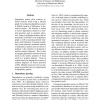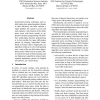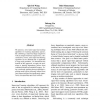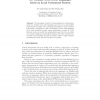114
click to vote
COLING
2010
14 years 9 months ago
2010
This demonstration presents a highperformance syntactic and semantic dependency parser. The system consists of a pipeline of modules that carry out the tokenization, lemmatization...
107
click to vote
COLING
2010
14 years 9 months ago
2010
We evaluate two dependency parsers, MSTParser and MaltParser, with respect to their capacity to recover unbounded dependencies in English, a type of evaluation that has been appli...
134
click to vote
ACL
2009
14 years 12 months ago
2009
Dependency parsers show syntactic relations between words using a directed graph, but comparing dependency parsers is difficult because of differences in theoretical models. We de...
122
click to vote
ACL
2010
15 years 4 days ago
2010
Statistical systems with high accuracy are very useful in real-world applications. If these systems can capture basic linguistic information, then the usefulness of these statisti...
110
click to vote
ACL
2010
15 years 4 days ago
2010
Incremental parsing techniques such as shift-reduce have gained popularity thanks to their efficiency, but there remains a major problem: the search is greedy and only explores a ...
107
click to vote
EMNLP
2008
15 years 3 months ago
2008
We explore a stacked framework for learning to predict dependency structures for natural language sentences. A typical approach in graph-based dependency parsing has been to assum...
ACL
2007
15 years 3 months ago
2007
This paper introduces a Maximum Entropy dependency parser based on an efficient kbest Maximum Spanning Tree (MST) algorithm. Although recent work suggests that the edge-factored ...
130
click to vote
ACL
2008
15 years 3 months ago
2008
We present a novel semi-supervised training algorithm for learning dependency parsers. By combining a supervised large margin loss with an unsupervised least squares loss, a discr...
124
click to vote
CICLING
2004
Springer
15 years 7 months ago
2004
Springer
We investigate the effect of unlexicalization in a dependency parser for variable word order languages and propose an unlexicalized parser which can utilize some contextual inform...




